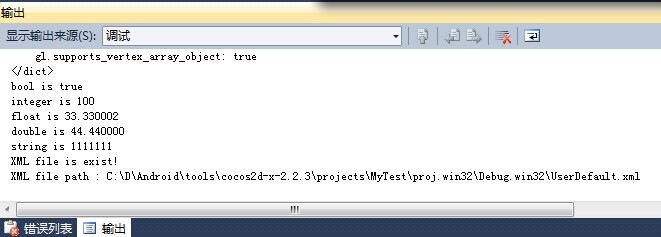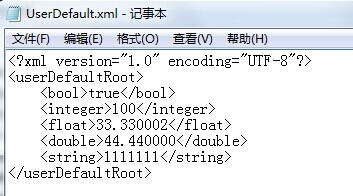【唠叨】
一个游戏怎么能没有游戏存档呢?在cocos2dx中也提供了一个数据存储类CCUserDefault,可以作为一个轻量级的数据库来使用。
它支持五种数据bool、int、float、double、string的存储。
【致谢】
http://gl.paea.cn/contents/252ac3e59bc18069.html
【CCUserDefault】
CCUserDefault类和之前讲的CCDirector、SimpleAudioEngine一样,都是采用单例模式。
可以通过sharedUserDefault()函数来获取其唯一的实例对象。
CCUserDefault采用XML存储技术,就是一般的键值对,这个类似C++中的map的映射(键——值)。一个关键字对应一个值。其实现的接口也比较简单实用,通过传统的set()、get()方法访问和修改值。
它支持五种数据:bool、int、float、double、string。
1、原理
(1)类似map的映射(键——值)。一个关键字对应一个值,并利用set()/get()进行访问。
(2)数据直接存储在一个XML文件中,并且文件名为程序项目的名字,如“MyTest.xml”。
(3)首次使用时,XML不存在,CCUserDefault会自动创建相应的XML文件。
2、设置数据值set
通过(键——值)的方式进行设置。
void setBoolForKey( const char* pKey, bool value); //设置一个bool值 void setIntegerForKey(const char* pKey, int value); //设置一个int值 void setFloatForKey( const char* pKey, float value); //设置一个float值 void setDoubleForKey( const char* pKey, double value); //设置一个double值 void setStringForKey( const char* pKey, const std::string& value); //设置一个string值
3、获取数据值get
通过关键字,来从XML文件中获取数据值。
若关键字不存在,会自动设置(键——值)映射,并设置对应的默认值defaultValue。
bool getBoolForKey( const char* pKey, bool defaultValue = false); //读取一个bool值 int getIntegerForKey(const char* pKey, int defaultValue = 0); //读取一个int值 float getFloatForKey( const char* pKey, float defaultValue = 0.0); //读取一个float值 double getDoubleForKey( const char* pKey, double defaultValue = 0.0); //读取一个double值 std::string getStringForKey( const char* pKey, const std::string& defaultValue = ""); //读取一个string值
4、保存flush
当set完后,数据不会马上保存到XML文件中。
所以一定要记得用flush()来保存数据,否则会丢失!
// CCUserDefault::sharedUserDefault()->flush(); //
5、其他操作
获取单例对象、释放单例对象、获取XML文件路径、判断XML文件是否已经存在。
// static CCUserDefault* sharedUserDefault(); //获取单例对象 static void purgeSharedUserDefault(); //释放单例对象 const static std::string& getXMLFilePath(); //获取XML路径 static bool isXMLFileExist(); //XML文件是否已创建 //
6、使用技巧
(1)每次操作都要打长长的CCUserDefault::sharedUserDefault(),来获得单例对象。是不是很麻烦呢?可以通过宏定义来缩短长度。
// #define UserDefault CCUserDefault::sharedUserDefault() //
(2)在使用的时候,要特别注意:区别 const char* 和 const std::string 是不一样的!
(3)当set完后,一定要记得用flush()来保存数据,否则会丢失!
【代码实战】
代码来源于TestCpp项目中。
(1)需要用到C++的string类型,所以需要引用以下的头文件和命名空间。
// #include <string> using namespace std; //
(2)宏定义获取单例对象的函数
// #define UserDefault CCUserDefault::sharedUserDefault() //
(3)编写数据存储相关操作,并在控制台输出数据值。
//设置set
UserDefault->setBoolForKey( "bool", true);
UserDefault->setIntegerForKey("integer", 100);
UserDefault->setFloatForKey( "float", 33.33f);
UserDefault->setDoubleForKey( "double", 44.44);
UserDefault->setStringForKey( "string", "1111111");
//获取get,并输出到控制台
//通过关键字,获取数据
bool b = UserDefault->getBoolForKey("bool");
int i = UserDefault->getIntegerForKey("integer");
float f = UserDefault->getFloatForKey("float");
double d = UserDefault->getDoubleForKey("double");
string ret = UserDefault->getStringForKey("string");
//输出到控制台
CCLOG( (b == true)? "bool is true" : "bool is false" );
CCLOG("integer is %d", i);
CCLOG("float is %f", f);
CCLOG("double is %f", d);
CCLOG("string is %s", ret.c_str());
//输出XML文件路径
if( UserDefault->isXMLFileExist() ) //是否存在
{
string path = UserDefault->getXMLFilePath();
CCLOG("XML file is exist!");
CCLOG( "XML file path : %s", path.c_str() );
}
else
{
CCLOG("XML file is not exist!");
}
//保存数据
UserDefault->flush();
// 运行结果:


分析:
(1)不知道大家是否发现输出的结果有问题?float我设置的是33.33,为何输出的是33.330002。不是应该输出33.330000才对吗?
这个就要讲讲C++浮点数的精度问题了,float是单精度浮点数,而double是双精度浮点数。float的有效精度在6~7位,超过7位就可能会失真,就像上面的那个例子一样。而double的有效进度在15~16位,超过16位才会失真。具体的原理,自行百度吧!
(2)getXMLFilePath()获取的XML文件路径为绝对路径。另外XML文件保存的路径为项目的Debug.win32中,说明XML文件是保存在应用程序所在目录下的。
【Demo下载】
本文出自 “夏天的风” 博客,请务必保留此出处http://shahdza.blog.51cto.com/2410787/1545948
cocos2dx基础篇(20)——数据存储CCUserDefault
原文地址:http://shahdza.blog.51cto.com/2410787/1545948